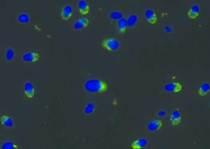ARG42439
anti-PRKAR2A / PKR2 antibody [Hs-36]
anti-PRKAR2A / PKR2 antibody [Hs-36] for ICC/IF,Western blot and Human
Overview
| Product Description | Mouse Monoclonal antibody [Hs-36] recognizes PRKAR2A / PKR2 |
|---|---|
| Tested Reactivity | Hu |
| Tested Application | ICC/IF, WB |
| Specificity | The antibody Hs-36 reacts with PRKAR2A (protein kinase A regulatory type II alpha subunit), an intra-acrosomal protein. |
| Host | Mouse |
| Clonality | Monoclonal |
| Clone | Hs-36 |
| Isotype | IgM |
| Target Name | PRKAR2A / PKR2 |
| Antigen Species | Human |
| Immunogen | Freshly ejaculated Human sperms were washed in PBS and extracted in 3% acetic acid, 10% glycerol, 30 mM benzaminidine. The acid extract was dialyzed against 0.2% acetic acid and subsequently used for immunization. |
| Conjugation | Un-conjugated |
| Alternate Names | cAMP-dependent protein kinase type II-alpha regulatory subunit; PRKAR2; PKR2 |
Application Instructions
| Application Suggestion |
|
||||||
|---|---|---|---|---|---|---|---|
| Application Note | * The dilutions indicate recommended starting dilutions and the optimal dilutions or concentrations should be determined by the scientist. |
Properties
| Form | Liquid |
|---|---|
| Purification | Precipitation and chromatography. |
| Buffer | TBS and 15 mM Sodium azide. |
| Preservative | 15 mM Sodium azide |
| Concentration | 1 mg/ml |
| Storage Instruction | For continuous use, store undiluted antibody at 2-8°C for up to a week. For long-term storage, aliquot and store at -20°C or below. Storage in frost free freezers is not recommended. Avoid repeated freeze/thaw cycles. Suggest spin the vial prior to opening. The antibody solution should be gently mixed before use. |
| Note | For laboratory research only, not for drug, diagnostic or other use. |
Bioinformation
| Database Links |
Swiss-port # P13861 Human cAMP-dependent protein kinase type II-alpha regulatory subunit |
|---|---|
| Gene Symbol | PRKAR2A |
| Gene Full Name | protein kinase, cAMP-dependent, regulatory, type II, alpha |
| Background | cAMP is a signaling molecule important for a variety of cellular functions. cAMP exerts its effects by activating the cAMP-dependent protein kinase, which transduces the signal through phosphorylation of different target proteins. The inactive kinase holoenzyme is a tetramer composed of two regulatory and two catalytic subunits. cAMP causes the dissociation of the inactive holoenzyme into a dimer of regulatory subunits bound to four cAMP and two free monomeric catalytic subunits. Four different regulatory subunits and three catalytic subunits have been identified in humans. The protein encoded by this gene is one of the regulatory subunits. This subunit can be phosphorylated by the activated catalytic subunit. It may interact with various A-kinase anchoring proteins and determine the subcellular localization of cAMP-dependent protein kinase. This subunit has been shown to regulate protein transport from endosomes to the Golgi apparatus and further to the endoplasmic reticulum (ER). [provided by RefSeq, Jul 2008] |
| Function | Regulatory subunit of the cAMP-dependent protein kinases involved in cAMP signaling in cells. Type II regulatory chains mediate membrane association by binding to anchoring proteins, including the MAP2 kinase. [UniProt] |
| Cellular Localization | Cytoplasm. Cell membrane. Note=Colocalizes with PJA2 in the cytoplasm and the cell membrane. [UniProt] |
| Calculated MW | 46 kDa |
| PTM | Phosphorylated by the activated catalytic chain. [UniProt] |
Images (1) Click the Picture to Zoom In






